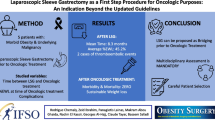Abstract
Purpose
Reports frequently describe the worsening of oncologic outcome in patients who developed high-grade complications after curative surgery for esophageal, gastric, and breast cancers. We investigated the extent of this correlation in patients with bladder cancer after radical cystectomy (RC).
Methods
During 2002–2017, we performed 326 RC and urinary diversion procedures and collected data regarding complications in these patients within 90 days postoperatively. We evaluated the severity of complications based on the modified Clavien–Dindo classification (grades 0–5). Grade ≥ 3 complications were considered high grade. After adjusting for confounding factors using a Cox regression model, we calculated the hazard ratios (HRs) for high-grade complications associated with recurrence-free survival (RFS) and cancer-specific survival (CSS).
Results
During a median follow-up period of 61 months, 38 patients (12%) developed high-grade complications (grade ≥ 3). The main causes (76%) of high-grade complications were gastrointestinal and infection problems. The RFS and CSS differed significantly between patients with high-grade complications and those without complications. After adjusting for confounding factors in the multivariate analysis, high-grade complications remained a significant risk factor for both RFS [HR 2.11; 95% confidence interval (CI) 1.07–4.15, p = 0.030] and CSS (HR 2.74; 95% CI 1.05–7.14, p = 0.039).
Conclusions
High-grade complications after RC led to worse RFS and CSS outcomes, similar to those observed in patients with other cancers. A large-scale study is needed to further verify these findings, and discussions of knowledge and experiences are required to reduce the incidence of postoperative high-grade complications.


Similar content being viewed by others
References
Parekh DJ, Reis IM, Castle EP et al (2018) Robot-assisted radical cystectomy versus open radical cystectomy in patients with bladder cancer (RAZOR): an open-label, randomised, phase 3, non-inferiority trial. Lancet 391:2525–2536. https://doi.org/10.1016/S0140-6736(18)30996-6
Shabsigh A, Korets R, Vora KC et al (2009) Defining early morbidity of radical cystectomy for patients with bladder cancer using a standardized reporting methodology. Eur Urol 55:164–176. https://doi.org/10.1016/j.eururo.2008.07.031
Rizk NP, Bach PB, Schrag D et al (2004) The impact of complications on outcomes after resection for esophageal and gastroesophageal junction carcinoma. J Am Coll Surg 198:42–50. https://doi.org/10.1016/j.jamcollsurg.2003.08.007
Fujiya K, Tokunaga M, Mori K et al (2016) Long-term survival in patients with postoperative intra-abdominal infectious complications after curative gastrectomy for gastric cancer: a propensity score matching analysis. Ann Surg Oncol 23:809–816. https://doi.org/10.1245/s10434-016-5577-5
Wang S, Liu J, Wang S, Zhao H, Ge S, Wang W (2017) Adverse effects of anastomotic leakage on local recurrence and survival after curative anterior resection for rectal cancer: a systematic review and meta-analysis. World J Surg 41:277–284. https://doi.org/10.1007/s00268-016-3761-1
Murthy BL, Thomson CS, Dodwell D, Shenoy H, Mikeljevic JS, Forman D, Horgan K (2007) Postoperative wound complications and systematic recurrence in breast cancer. Br J Cancer 97:1211–1217. https://doi.org/10.1038/sj.bjc.6604004
Roxburgh CS, Horgan PG, McMillan DC (2013) The perioperative immune/inflammatory insult in cancer surgery. Oncoimmunology 2:e27324. https://doi.org/10.4161/onci.27324
Salvans S, Mayol X, Alonso S et al (2014) Postoperative peritoneal infection enhances migrations and invasion capacities of tumor cells in vitro: an insight into the association between anastomotic leak and recurrence after surgery for colorectal cancer. Ann Surg 260:939–944. https://doi.org/10.1097/SLA.0000000000000958
Green LF, Page DL, Fleming ID, Fitz AG, Balch CM, Haller DG, Morrow M (2002) American joint committee on cancer (AJCC) cancer staging manual, 6th edn. Springer-Verlag, New York
Mostfi FK, Davis CJ, Sesterhenn IA (1999) International histological classification of tumours: Histological typing of urinary bladder tumours. Springer-Verlag, Berlin
Roth B, Birkhäuser FD, Zehnder P, Burkhard FC, Thalmann GN, Studer UE (2011) Readaptation of the peritoneum following extended pelvic lymphadenectomy and cystectomy has a significant beneficial impact on early postoperative recovery and complications: results of a prospective randomized trial. Eur Urol 59:204–210. https://doi.org/10.1016/j.eururo.2010.10.030
Novara G, Catto JW, Wilson T et al (2015) Systematic review and cumulative analysis of perioperative outcomes and complications after robot-assisted radical cystectomy. Eur Urol 67:376–401. https://doi.org/10.1016/j.eururo.2014.12.007
Tyson MD, Chang SS (2016) Enhanced recovery pathways versus standard care after cystectomy. Eur Urol 70:995–1003. https://doi.org/10.1016/j.eururo.2016.05.031
Routy B, Le Chatelier E, Derosa L et al (2018) Gut microbiome influences efficacy of PD-1-based immunotherapy against epithelial tumors. Science 359:91–97. https://doi.org/10.1126/science.aan3706
Atarashi K, Tanoue T, Shima T et al (2011) Induction of colonic regulatory T cells by indigenous clostridium species. Science 331:337–341. https://doi.org/10.1126/science.1198469
Burg ML, Clifford TG, Bazargani ST et al (2019) Frailty as a predictor of complications after radical cystectomy: a prospective study of various preoperative assessments. Urol Oncol 37:40–47. https://doi.org/10.1016/j.urolonc.2018.10.002
Acknowledgements
The authors thank Eiji Kikuchi for his supervision and insight.
Author information
Authors and Affiliations
Corresponding author
Ethics declarations
Conflict of interest
We have no conflicts of interest regarding this article.
Human and animal rights
This retrospective single-center study was approved by the ethical review committee of Shizuoka Cancer Center (Number 2255).
Informed consent
The requirement for informed consent was waived because of the retrospective nature of the study.
Additional information
Publisher's Note
Springer Nature remains neutral with regard to jurisdictional claims in published maps and institutional affiliations.
Rights and permissions
About this article
Cite this article
Yamashita, R., Nakamura, M., Notsu, A. et al. The occurrence of high-grade complications after radical cystectomy worsens oncological outcomes in patients with bladder cancer. Int Urol Nephrol 52, 475–480 (2020). https://doi.org/10.1007/s11255-019-02341-9
Received:
Accepted:
Published:
Issue Date:
DOI: https://doi.org/10.1007/s11255-019-02341-9




